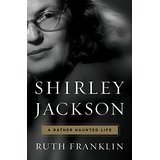2018 School Spending Survey Report
Shirley Jackson: A Rather Haunted Life
Liveright: Norton. Sept. 2016. 656p. photos. notes. bibliog. index. ISBN 9780871403131. $35; ebk. ISBN 9781631492129. LIT
COPY ISBN
 Despite battles with anxiety, oppressive societal expectations, and a fraught relationship with husband, literary critic Stanley Edgar Hyman, Shirley Jackson (1916–65) wrote six novels, a collection of short fiction, and a handful of nonfiction and children's books. Even though her promise as a writer of supernatural suspense reached fruition with The Haunting of Hill House, the author's most infamous work was the short story "The Lottery." The story—Jackson claimed to have written it in a single day—generated unprecedented buzz, confusion, antipathy, and even hate mail. Yet as Franklin (A Thousand Darknesses) points out in her engaging portrait, Jackson is far from a one-hit wonder. Franklin writes that "[her] brand of literary suspense is part of a vibrant and distinguished tradition that can be traced back to the American Gothic work of Nathaniel Hawthorne, Edgar Allan Poe, and Henry James." Drawing on a trove of research—including previously unpublished letters and interviews—and her own astute analysis of Jackson's fiction, Franklin gives her subject her much-deserved due and sets the standard for future literary biographers wrestling with the legacy and the unwarranted inattention of a major figure in 20th-century American literature.
Despite battles with anxiety, oppressive societal expectations, and a fraught relationship with husband, literary critic Stanley Edgar Hyman, Shirley Jackson (1916–65) wrote six novels, a collection of short fiction, and a handful of nonfiction and children's books. Even though her promise as a writer of supernatural suspense reached fruition with The Haunting of Hill House, the author's most infamous work was the short story "The Lottery." The story—Jackson claimed to have written it in a single day—generated unprecedented buzz, confusion, antipathy, and even hate mail. Yet as Franklin (A Thousand Darknesses) points out in her engaging portrait, Jackson is far from a one-hit wonder. Franklin writes that "[her] brand of literary suspense is part of a vibrant and distinguished tradition that can be traced back to the American Gothic work of Nathaniel Hawthorne, Edgar Allan Poe, and Henry James." Drawing on a trove of research—including previously unpublished letters and interviews—and her own astute analysis of Jackson's fiction, Franklin gives her subject her much-deserved due and sets the standard for future literary biographers wrestling with the legacy and the unwarranted inattention of a major figure in 20th-century American literature.
VERDICT Highly recommended for readers of Jackson's fiction as well as those interested in the connection between the inner lives of authors and their work. [See Prepub Alert, 3/28/16.]
RELATED
ALREADY A SUBSCRIBER? LOG IN
We are currently offering this content for free. Sign up now to activate your personal profile, where you can save articles for future viewing




Comment Policy:
Comment should not be empty !!!